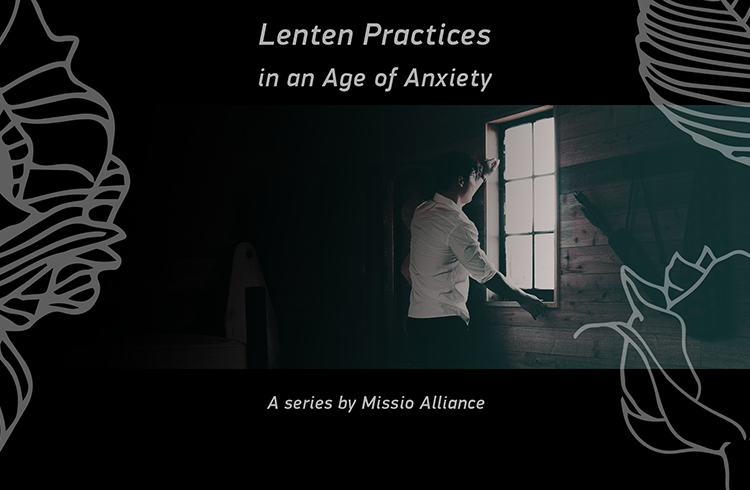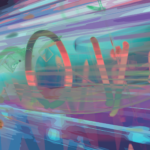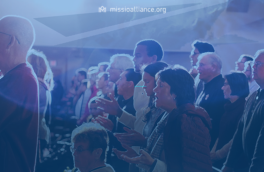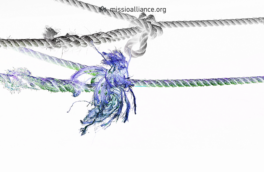(Editor’s Note: We are doing a seven-part series on Lenten Practices in an Age of Anxiety, which will run every Wednesday; this is the second article of the series and you can find the first one here, by MaryKate Morse. May this series help you enter more intentionally and thoughtfully into your Lenten journey.)
Two brothers one day sat across from one another in a local tavern. The younger was a devout believer; the older an atheist and an extreme skeptic.
After a pleasant greeting, the conversation quickly took a religious and philosophical turn. The skeptical brother would love to believe in God, so he claimed, but he simply could not—the world as he saw it was too full of cruelty and brutality, especially the brutality of human beings towards one another, the kind of brutality that only human beings are capable of: intellectual, premeditated, rational cruelty.
He began to enumerate examples to his younger brother: a foreign army well known for needlessly slaughtering the children of its conquered foes; a young man executed for a crime for which he could hardly have been held fully morally responsible; a very public trial in which a mother and a father accused of the extreme abuse of their young daughter bribed their way to a ‘not guilty’ verdict; a high ranking government official who punished one of his young subordinates for a mistake by arranging to have him brutally murdered and who himself went un-punished when his superiors brushed the incident under the bureaucratic rug to protect his public image.
The believing younger brother listened attentively as the examples multiplied. His heart sickened, for he knew what was coming. The skeptic brought his diatribe to a conclusion by offering what he saw as the central philosophical dilemma for faith in God. “The price is too high to pay,” he said. “Christianity insists that God made human beings free. Free on the one hand to choose love—love for God and for others, thereby entering into and bringing blessing to the world. Free on the other hand to choose evil—hatred for God and cruelty towards human beings, thereby not only entering into but making life a living hell for others.” The younger brother felt the screws tighten. “If you were the Creator,” the older continued, “and the torture of even one innocent creature was worth the price of human freedom, would you do it? Would you create? Would it be worth it?”
“No,” the younger admitted, feeling helpless and defeated in the face of the onslaught. “I wouldn’t. It wouldn’t be worth it.”
Under the Canopy of Saintliness
Readers of the Russian novelist Fyodor Dostoevsky will immediately recognize the story I’ve just told as the encounter which takes place between the hero of his classic novel The Brothers Karamazov, Alyosha, and his older brother Ivan. It is one of my favorites, especially for how it paints the philosophical dilemmas of Christianity in bold colors. I just happened to be rereading it when my newsfeed was suddenly ablaze with the devastating report of the late Jean Vanier.
Needless to say, “helpless and defeated” were just two of the emotions I felt. Like many, I regarded Vanier as a hero. A modern saint who stood against the cultural tide and modeled a better way. A way defined by love for the pushed-aside and forgotten, for the down-and-out and victimized. A way defined by the call to be a voice for the voiceless, a defender of those who cannot defend or care for themselves. A way marked by what Vanier himself called “the wisdom of tenderness.” He was a man to admire and emulate.
To learn, therefore, about the decades of sexual abuse and ministerial misconduct carried on by Vanier under the cover of his office was not just heartbreaking—it was chilling. According to reports, both Vanier and his mentor, the late Rev. Thomas Philippe, used the power of their offices as spiritual directors to coerce women into sexual relationships. Their tactics almost perfectly mirrored one another’s, each of them going so far as to utilize biblical tropes like the relationship between Jesus and Mary Magdalene to suggest a sexual relationship between spiritual director and directee.
“The relationships,” according to a report released by an agency hired by L’Arche (the organization Vanier founded) to investigate allegations against Vanier, “are described as emotionally abusive and characterized by significant imbalances of power, whereby the alleged victims felt deprived of their free will and so the sexual activity was coerced or took place under coercive conditions” (as quoted in Julie Zauzmer’s Washington Post piece).
What words can we use to describe evil like this? Heinous, diabolical, and demonic are just a few that come to mind. And somehow even they feel too weak.
What staggers belief is not simply that abuse was perpetrated, sickening as that may be. Nor is it primarily how premeditated, rational, and calculated it all was. No, for me, it was the fact that this rank wickedness was all concealed under the canopy of saintliness, wrapped up in the garments of holiness, powered by the illusion of tenderness. What staggers belief is not simply that abuse was perpetrated...it was the fact that this rank wickedness was concealed under the canopy of saintliness, wrapped up in the garments of holiness, powered by the illusion of tenderness. Click To Tweet
That is what, for me, is so difficult to fathom and what makes this debacle so unthinkably perverse. Jean Vanier knowingly and purposely used us. He used all of us. All of us who bought into his public image. The image created a power imbalance of which he took full advantage to victimize these women. Moreover—let this sink in—he used the figure of Christ Jesus to perpetrate sexual violence.
God in heaven, have mercy on us.
Hope for Anxious Hearts
This past Wednesday, in communities of faith all over the world, words to this effect were uttered:
I invite you, therefore, in the name of the Church, to the observance of a holy Lent, by self-examination and repentance; by prayer, fasting, and self-denial; and by reading and meditating on God’s holy Word. And, to make a right beginning of repentance, and as a mark of our mortal nature, let us now kneel before the Lord, our maker, and redeemer.
The congregation kneeled, while the celebrant continued:
Almighty God, you have created us out of the dust of the earth: Grant that these ashes may be to us a sign of our mortality and penitence, that we may remember that it is only by your gracious gift that we are given everlasting life; through Jesus Christ our Savior. Amen.
Members of the gathered community then came forward, having ashes smeared on their foreheads with the sign of the cross, under the banner of the admonition to…
Remember that you are dust, and to dust you shall return.
On Ash Wednesday the church is called to a kind of holy sobriety, summoned to remember that our hope is not found in our own efforts to fix ourselves, our communities, or the world around us. It is found in the power of God—the same power that raised Christ Jesus from the dead. Resurrection is not a human possibility. It is the gift of merciful God.
W. H. Auden coined the phrase “age of anxiety” in the 1940s, and it remains an altogether apt description of the times we live in. It is difficult in the face of the Vanier debacle not to feel at least a touch of anxiety. Some of us may indeed be feeling wave upon wave of it. We might have expected this kind of behavior out of Hollywood or Wall Street, or from a slick, fantastically-wealthy televangelist. But not from Jean. His failure leaves us feeling exposed and vulnerable to the haunting specter of meaninglessness that ever lurks at the edges of our lives, that ever stalks our hearts. How do we explain this? What can we do about it? Who can we trust? Or is this all a huge waste of time…?
In our anxiety we start blaming the system and its perpetrators, proposing new institutional, cultural, and philosophical solutions, searching wildly for new heroes to emulate. We are desperate to meet Ivan Karamazov’s challenge, to show that it’s all worth it, it really is. The thought that we might not be able to—I need hardly say: it terrifies us.
May I put your mind at ease? You cannot meet the challenge. Neither can I. None of us can. Dust cannot breathe into its own nostrils. The dead cannot bring about their own resurrection. Salvation is not from below. It is from above. It is pure gift, pure grace, pure miracle. The New Jerusalem descends to us from God’s side of eternity; it does not emerge from ours. Dust cannot breathe into its own nostrils. The dead cannot bring about their own resurrection. Salvation is not from below. It is from above. It is pure gift, pure grace, pure miracle. Click To Tweet
That does not mean that we won’t work, or that we don’t have work to do. As God is in heaven, we will and we do. We will pray the cleansing judgment of God into L’Arche and into every community of faith spread out across this precious, dying, pale blue dot. We will seek to ensure that, as far as it depends on us, justice is done to the victimized everywhere and in every way. We will humble ourselves before the throne of Almighty God pleading for eyes to see and ears to hear and hearts to know and to understand how to live and love more faithfully as followers of Jesus.
And we will do it all knowing that it is not enough. It never could be. Only God can save us. Only God will save us. And so we push our chips to the middle of the table on the wager that the same God who raised Jesus from the dead will raise us also. That is our hope—a hope that alone is able to bring peace to our troubled, anxious hearts.
Such a wager allows us to throw ourselves fearlessly to the concrete practice of leaning into the truth, wherever it takes us; of seeking to do justice, however incomplete it may feel; of correcting broken systems and toxic cultures, however futile it may sometimes seem. In so doing we demonstrate outwardly that we’re not betting on ourselves; we’re betting on God.












Missio Alliance Comment Policy
The Missio Alliance Writing Collectives exist as a ministry of writing to resource theological practitioners for mission. From our Leading Voices to our regular Writing Team and those invited to publish with us as Community Voices, we are creating a space for thoughtful engagement of critical issues and questions facing the North American Church in God’s mission. This sort of thoughtful engagement is something that we seek to engender not only in our publishing, but in conversations that unfold as a result in the comment section of our articles.
Unfortunately, because of the relational distance introduced by online communication, “thoughtful engagement” and “comment sections” seldom go hand in hand. At the same time, censorship of comments by those who disagree with points made by authors, whose anger or limited perspective taints their words, or who simply feel the need to express their own opinion on a topic without any meaningful engagement with the article or comment in question can mask an important window into the true state of Christian discourse. As such, Missio Alliance sets forth the following suggestions for those who wish to engage in conversation around our writing:
1. Seek to understand the author’s intent.
If you disagree with something the an author said, consider framing your response as, “I hear you as saying _________. Am I understanding you correctly? If so, here’s why I disagree. _____________.
2. Seek to make your own voice heard.
We deeply desire and value the voice and perspective of our readers. However you may react to an article we publish or a fellow commenter, we encourage you to set forth that reaction is the most constructive way possible. Use your voice and perspective to move conversation forward rather than shut it down.
3. Share your story.
One of our favorite tenants is that “an enemy is someone whose story we haven’t heard.” Very often disagreements and rants are the result of people talking past rather than to one another. Everyone’s perspective is intimately bound up with their own stories – their contexts and experiences. We encourage you to couch your comments in whatever aspect of your own story might help others understand where you are coming from.
In view of those suggestions for shaping conversation on our site and in an effort to curate a hospitable space of open conversation, Missio Alliance may delete comments and/or ban users who show no regard for constructive engagement, especially those whose comments are easily construed as trolling, threatening, or abusive.